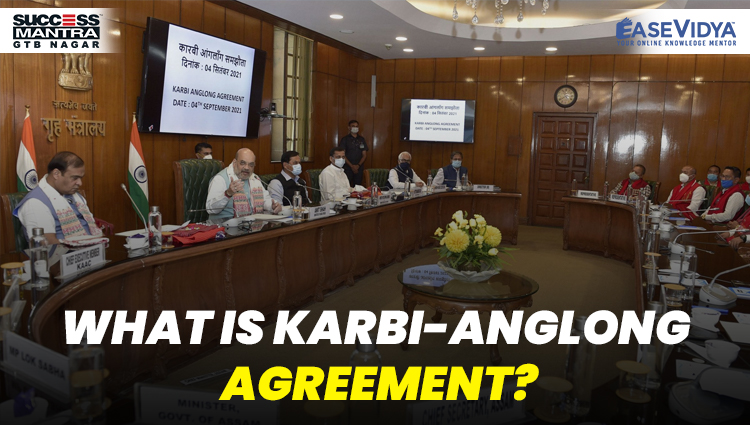
WHAT IS KARBI ANGLONG AGREEMENT?
WHAT IS KARBI-ANGLONG AGREEMENT?
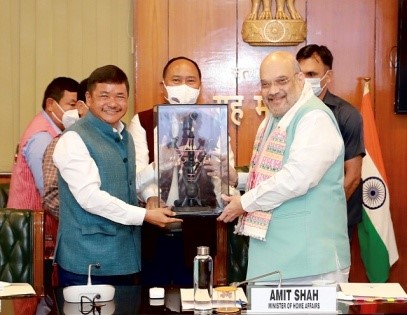
The centre signed a tripartite agreement- "Karbi Anglong Agreement" on September 4, 2021 with representatives of Karbi outfits in New Delhi. The agreement was signed in the presence of Union Home Minister Amit Shah and Assam Chief Minister Himanta Biswa Sarma. The agreement was signed by a delegation of six Karbi group members including Karbi People's Liberation Tigers (R), Karbi Longri North Cachar Hills Liberation Front, Karbi People's Liberation Tigers (Ceasefire), People's Democratic Council of Karbi Longri, Karbi People's Liberation Tigers (M) and United People's Liberations Army. This agreement is in synergy with the vision of Insurgency free prosperous North East, that envisages all-round development of northeast, peace and prosperity.
ABOUT THE KARBI ANGLONG CRISIS
Located in central Assam, Karbi Anglong is the state’s largest district and a melting pot of ethnicities and tribal groups — Karbi, Dimasa, Bodo, Kuki, Hmar, Tiwa, Garo, Man (Tai speakers), Rengma Naga. Its diversity also generated different outfits and fuelled an insurgency that did not allow the region to develop. The Karbis are a major ethnic group of Assam, dotted by several factions and splinters. The history of the Karbi group has been marked by killings, ethnic violence, abductions and taxation since the late 1980s. Insurgent groups of Karbi Anglong district like People's Democratic Council of Karbi Longri (PDCK), Karbi Longri NC Hills Liberation Front (KLNLF), etc. originated from the core demand of forming a separate state.
Some of the other demands of the militant groups are:
- Inclusion of some areas into Karbi Anglong Autonomous Council (KAAC),
- Reservation of seats for Scheduled Tribes,
- More powers to the council,
- Inclusion of Karbi language in the Eighth Schedule,
- Financial package of Rs 1,500 crore.
WHO ARE THE KARBIS?
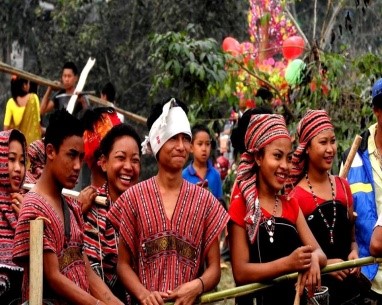
Karbis is a major ethnic community of Assam, which is presently splintered into various groups and factions. Originally, they are one of Northeast India’s tribal groups, largely inhabiting the Karbi Anglong and Dima Hasao (formerly North Cachar) hills districts. The Karbi Anglong Agreement is important as an insurgency by Karbi has had a long history in Assam, which has been marked by killings, ethnic violence, abductions and taxation since the late 1980s. The agreement hopes to bring an end to this violence and establish peace in the state. Around 1000 Karbi militants had surrendered before the Assam government in February 2021. Around 150 of those Karbi militants reached North Block where the Karbi Anglong Agreement was being signed and about 15 of them were present in the meeting.
Note: The Karbi Anglong Autonomous Council (KAAC) is an autonomous district council, protected under the Sixth Schedule of the Indian Constitution.
HIGHLIGHTS OF THE KARBI ANGLONG PEACE AGREEMENT
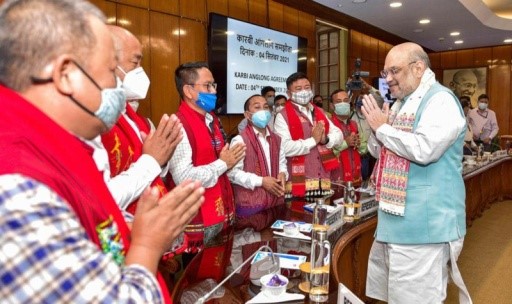
- Karbi Outfits Surrendered: 5 militant organizations (KLNLF, PDCK, UPLA, KPLT and KLF) laid down arms and more than 1000 of their armed cadres have given up violence and joined the mainstream of society.
- Special Development Package: A special development package of 1000 crore will be allocated over five years by the Central Government and the Assam Government to take up special projects for the development of Karbi areas.
- More Autonomy to KAAC: This agreement will transfer as much autonomy as possible in exercising their rights to the Karbi Anglong Autonomous Council, without affecting the territorial and administrative integrity of Assam. Overall, the present agreement proposes to give more legislative, executive, administrative and financial powers to the KAAC.
- Rehabilitation: A provision has been made in this agreement to rehabilitate the cadres of armed groups.
- Development of Local People: The Government of Assam will set up a Karbi Welfare Council to focus on the development of the Karbi people living outside the KAAC area. This agreement will also ensure the protection of the culture, identity, language, etc. of the Karbi people and all-round development of the region. The Consolidated Fund of the State will be amended to meet the resources of the KAAC.
OTHER RECENT PEACE AGREEMENTS OF THE NORTHEAST
- NLFT Tripura Agreement, 2019: National Liberation Front of Twipra (NLFT) has been banned under the Unlawful Activities (Prevention) Act, 1967 since 1997 and has been involved in violence, operating from their camps across the international border. NLFT signed a Memorandum of Settlement on 10th of August, 2019 with the Government of India and Tripura. Under this, a Special Economic Development Package (SEDP) of Rs.100 crore has been offered by the Government of India for a period of five years.
- Bru Accord, 2020: Bru or Reang is a community indigenous to Northeast India, living mostly in Tripura, Mizoram and Assam. In Tripura, they are recognised as a Particularly Vulnerable Tribal Group. In Mizoram, they have been targeted by groups that do not consider them indigenous to the state. In 1997, following ethnic clashes, nearly 37,000 Brus fled Mizoram and were accommodated in relief camps in Tripura. Under the Bru accord, the permanent settlement of 6959 Bru families in Tripura with a financial package has been agreed between the Government of India, Tripura and Mizoram with representatives of Bru migrants.
- Bodo Peace Accord: Bodos are the single largest community among the notified Scheduled Tribes in Assam. They have been demanding a Bodo state since 1967-68. In 2020, the Government of India, Government of Assam and representatives of Bodo groups signed an agreement, wherein the Bodoland Territorial Area District (BTAD) was redrawn and renamed as the Bodoland Territorial Region (BTR), in Assam.










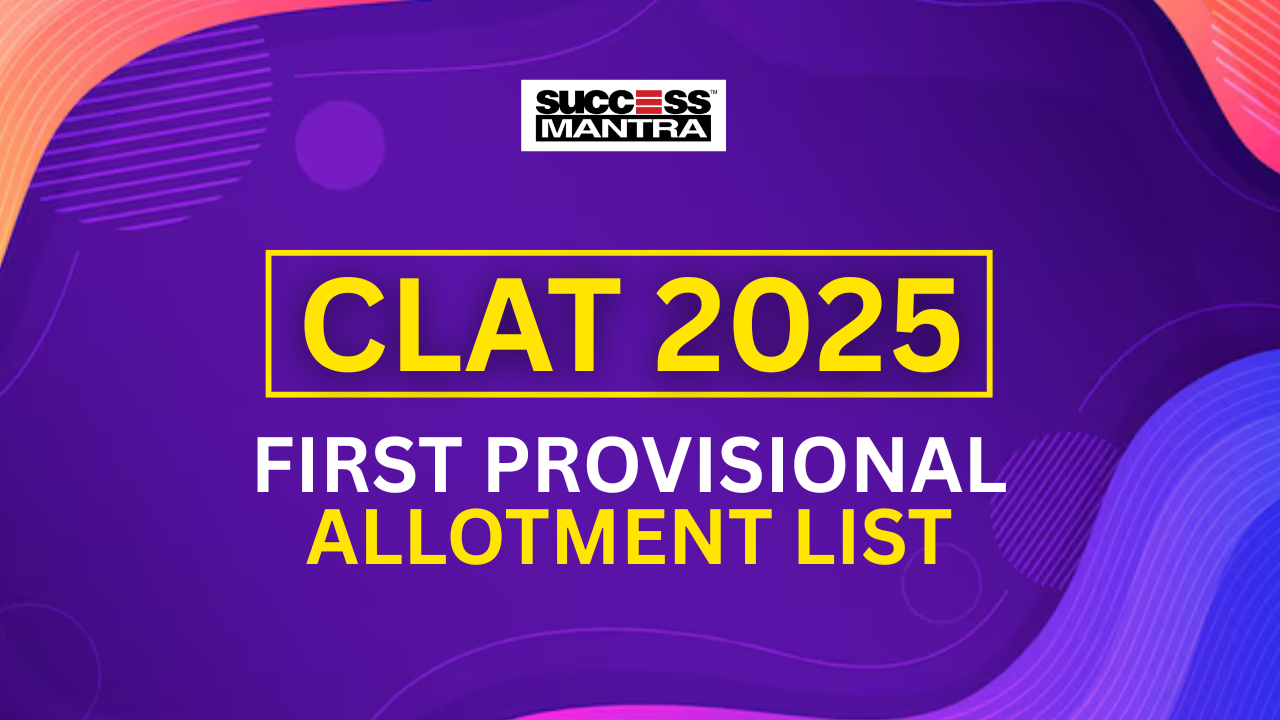


0 Comment